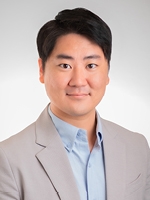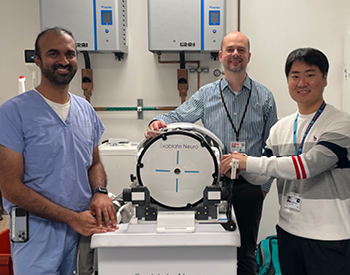Kisoo Kim, PhD Spotlight

September 18, 2023
Kisoo Kim, PhD, is a postdoctoral fellow in the Department of Radiology & Biomedical Imaging who researches MR-guided focused ultrasound of the brain, head, and neck. He is the proud recipient of a new K99 Pathway to Independence Award from the National Institute of Dental and Craniofacial Research (NIDCR), for research to advance imaging techniques of MR-guided hyperthermia as non-surgical approaches to treating head and neck tumors. He is also developing MRI methods for monitoring the blood-brain barrier opening and assessing the therapeutic effects on tumor hypoxia.
 Dr. Kim credits mentor Chris Diederich, PhD, from the Department of Radiation Oncology for his good advice on preparing the successful K99 grant. During the 18 months between submitting the application and receiving the award notice, Dr. Kim was busy reading and summarizing research papers on the cutting-edge advancements in the various disciplines his research touches. During this period, Dr. Kim also recalled his late grandfather’s work ethic and example as a source of inspiration: “My grandfather worked for 70 years as a barber. He taught me the value of living with perseverance and enthusiasm in one's chosen field.”
Dr. Kim credits mentor Chris Diederich, PhD, from the Department of Radiation Oncology for his good advice on preparing the successful K99 grant. During the 18 months between submitting the application and receiving the award notice, Dr. Kim was busy reading and summarizing research papers on the cutting-edge advancements in the various disciplines his research touches. During this period, Dr. Kim also recalled his late grandfather’s work ethic and example as a source of inspiration: “My grandfather worked for 70 years as a barber. He taught me the value of living with perseverance and enthusiasm in one's chosen field.”
Maintaining that enthusiasm is crucial in both scientific research and grant writing. Applying for the K99 grant involved preparing numerous documents, building a strong scientific team, providing references, and, of course, developing a creative idea with the potential to launch an independent and multi-disciplinary research career. MR-guided focused ultrasound is ideal for this, as it combines MRI, imaging processing, ultrasound physics, and mechanical and pharmaceutical engineering. Dr. Kim likes to quote a phrase from the art world, “Creative collaboration and collaborative creativity,” which aptly describes his experience at UCSF, where he has found inspiring colleagues and mentors.
The process of choosing this field and UCSF was a journey from South Korea to France to the US. While Kim was pursuing his master’s degree in biomedical engineering at Kyung Hee University, South Korea, with his mentor Dr. Soo Yeol Lee, he became captivated by the idea of developing medical devices for cancer treatment using the tools and techniques of electromagnetic engineering. There he began to focus on the intersection of MR and ultrasound.
 Kim’s next big move was to France to join CNRS-University of Strasbourg’s ICUBE laboratory. This opportunity came in the form of a job posted at the ISMRM annual meeting: Kim’s interest was piqued by an MR elastography project to monitor the therapeutic response of focused ultrasound ablation. His father might have joked that he lost his son, moving so far away, but Kim found a great research environment in Strasbourg, where he completed his PhD in biotechnology. He is still in contact with his former supervisors, Dr. Elodie Breton and Dr. Jonathan Vappou, and they provided crucial references for the K99 grant. At a later ISMRM meeting, Dr. Kim met Eugene Ozhinsky, PhD, with whom he discussed his project on MR-guided focused ultrasound hyperthermia. That exchange sparked Dr. Kim’s interest and motivated him to join UCSF where he now works closely with Dr. Ozhinsky. Under his supervision, Dr. Kim developed a real-time, motion-robust MR thermometry technique.
Kim’s next big move was to France to join CNRS-University of Strasbourg’s ICUBE laboratory. This opportunity came in the form of a job posted at the ISMRM annual meeting: Kim’s interest was piqued by an MR elastography project to monitor the therapeutic response of focused ultrasound ablation. His father might have joked that he lost his son, moving so far away, but Kim found a great research environment in Strasbourg, where he completed his PhD in biotechnology. He is still in contact with his former supervisors, Dr. Elodie Breton and Dr. Jonathan Vappou, and they provided crucial references for the K99 grant. At a later ISMRM meeting, Dr. Kim met Eugene Ozhinsky, PhD, with whom he discussed his project on MR-guided focused ultrasound hyperthermia. That exchange sparked Dr. Kim’s interest and motivated him to join UCSF where he now works closely with Dr. Ozhinsky. Under his supervision, Dr. Kim developed a real-time, motion-robust MR thermometry technique.
At UCSF, Dr. Kim was surprised and excited to find an excellent culture of communication between researchers, physicians, and hospital staff. In his previous roles, he observes that researchers and engineers had a tendency for tunnel-vision focused on their own techniques and technicaldevelopments. In contrast, he finds that UCSF colleagues are very eager to build bridges from basic science to clinical translation. Dr. Kim has worked with Kazim Narsinh, MD, in our neuroendovascular surgery service to develop a new biomarker to monitor the use of focused ultrasound in opening the blood-brain barrier without using MRI contrast. This innovation has the potential to aid in drug delivery and imaging. Dr. Kim says this atmosphere of collaboration is what makes UCSF special. “I think myself fortunate to have the opportunity to work with my faculty mentors, Drs. Diederich, Larson, Ozhinsky, and Narsinh. Their endless support has provided me with a sense of purpose during the K99 grant waiting period. There’s this different perspective here of working together. It’s great when you can have engineers and clinicians with very different skill sets collaborating. I am grateful to be at UCSF.”
